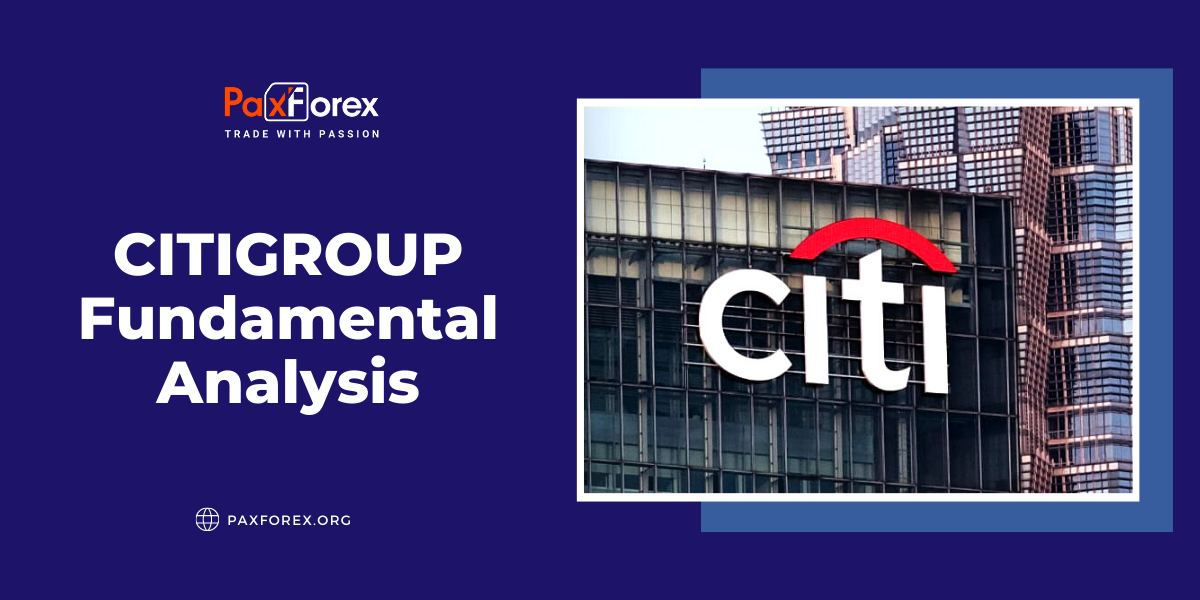
Source: PaxForex Premium Analytics Portal, Fundamental Insight
Since brand-new CEO Jane Fraser took the helm at Citigroup earlier this year, the company has embarked on a multi-year strategy refresh. It includes fixing regulatory problems, simplifying the bank, investing in businesses where the bank has impulse and scale, and ultimately improving profitability to become better than its competitors.
While progress on these efforts seems slow at times this year - and the stock has been a bit slow as opposed to rivals - the view of Fraser and her management team is moving forward, though not always in the smoothest of ways. Let's take a look at how things are going and what that could mean for the stock.
Citigroup has a very extensive organization that can be complex to manage and sometimes difficult for investors to understand. In October last year, regulators issued a cease-and-desist order to the bank and imposed a $400 million fine for failing to improve controls across the board. In part, Fraser and management are attempting to curb the bank's underperforming units that lack the required scale to compete and invest in areas where the bank is strong, such as wealth management, investment banking, securities services, and treasury and trading solutions.
Fraser took the first big step in the renewal when the bank announced it would sell or wind down consumer banking franchises in 13 global markets. These sectors were very ineffective and were eating up a lot of capital. At this point, Citigroup has announced it will sell or exit two of these markets. Primary, Citi declared the sale of its Australian consumer banking franchise to National Australia Bank for about $885 million, following a small premium to book value. Next, Citigroup lately said that it is going to diminish its South Korean consumer banking operation without a sale. These two sales were not without costs. Citigroup incurred a pre-tax charge of $680 million in the third quarter related to the sale of Australian assets, and then said it could incite up to $1.5 billion in charges related to the termination of its South Korean operations.
Nevertheless, Australia and South Korea were two of the major 13 markets. According to Citigroup CFO Mark Mason, the sale of the Australian sector freed up about $800 million of regulatory capital, and exiting South Korea would free up about $2 billion more. Given that about $7 billion of capital was spent in the 13 markets, that frees up a significant amount of it.
Citigroup will have a chance to utilize the freed-up capital to solve regulatory problems, invest in more promising and higher-yielding businesses, and buy back shares, which is especially attractive now that the bank's stock is trading below its book value, which is what the financial titan would be worth if it were liquidated immediately.
Such foreclosures and a net wind-down in South Korea are not perfect, but at least management seems to be in no hurry. In addition, the Financial Times, quoting anonymous sources, latterly published that 40 potential buyers have submitted final proposals for the left 11 global consumer banking franchises that Citigroup intends to sell. The deals are expected to close by the second quarter of 2022.
In other strategic news, Citigroup's head of U.S. consumer banking, Gonzalo Luchetti, recently told Bloomberg that the bank is "doubling" the number of branches in six major U.S. markets. The question of how Citigroup can do more with its U.S. banking operations has been a key one among analysts for years. Citigroup is a large and recognizable brand in the U.S., but it has the smallest share of the U.S. deposit market. This gap has driven some to question if Citigroup would ever consider buying another U.S. bank, so it will be interesting to see how the bank's internal strategy changes during the strategy update.
Due to Citigroup's long history of poor performance this year, the market remains skeptical of the renewal plan. The key catalysts moving forward will be earnings reports, announcements of further sales of global consumer franchises, and, of course, Investor Day in March, where Fraser and Citigroup management are expected to present more details about the strategy update.
But for now, the plan seems to be moving forward. Investors can buy Citigroup stock while it's trading below book value and can get paid for waiting for the turnaround to take effect, thanks to the stock's nearly 3% dividend yield at the current price.
As long as the price is above 67.00, follow the recommendations below:
- Time frame: D1
- Recommendation: long position
- Entry point: 68.78
- Take Profit 1: 72.20
- Take Profit 2: 73.50
Alternative scenario:
If the level of 67.00 is broken-down, follow the recommendations below:
- Time frame: D1
- Recommendation: short position
- Entry point: 67.00
- Take Profit 1: 64.80
- Take Profit 2: 63.60













